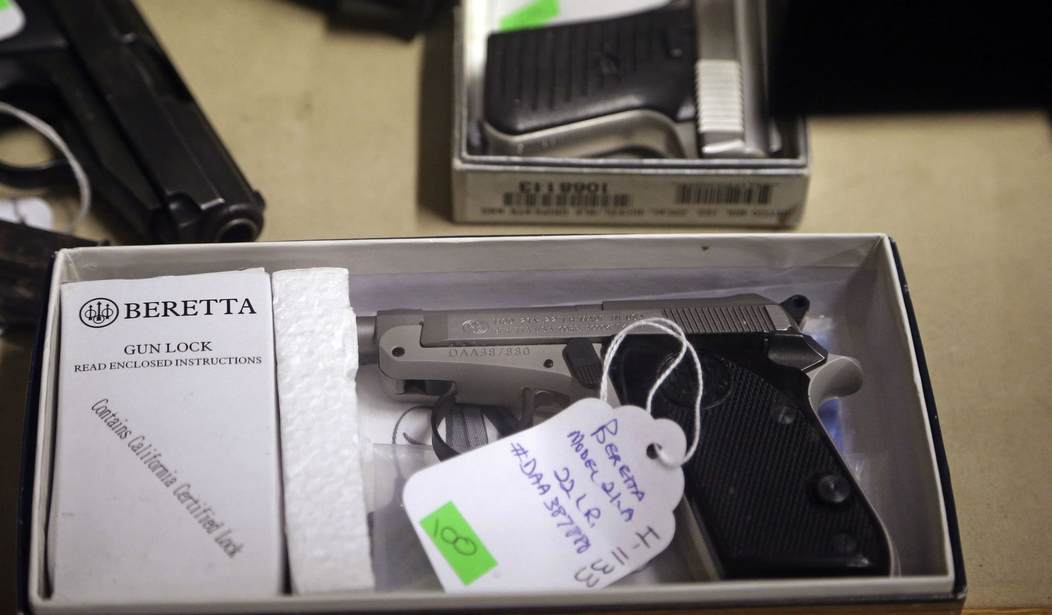A new outfit called the Gun Safety Consortium is hoping to advance the gun control agenda, but not necessarily through legislation. The group, which is made up of mayors, police chiefs, and other public officials, say they want to use the purchasing power of local governments to compel firearms manufacturers to adopt policies and practices favored by gun control advocates, starting with so-called smart gun technology.
“This is a group that has decided to take local action to create a market that doesn’t exist or up until now hasn’t existed,” Toledo Mayor Wade Kapszukiewicz said.
The Gun Safety Consortium met Tuesday morning to call for smart gun technology, or innovative gun locks that will keep firearms secure, as data shows that more than half of registered gun owners in the country don’t keep their weapon locked up because they want quick access to it.
“I think any time you talk gun violence, you have to have a multiprong approach and it has to be multifaceted and this is just one of the facets of a gun prevention and gun violence initiative,” Lansing Police Chief Daryl Green said.
Quick-release gun locks or tracking technology are some of the proposed ideas.
The group hopes to use its purchasing power, made up of 31 jurisdictions — including cities, counties and individual law enforcement entities — to buy the products and encourage others to do the same.
“Government buys four out of every 10 guns sold in America, 40%, and when you combine military and law enforcement, it made sense that we could have a consumer revolution,” Cincinnati Mayor John Cranley said.
Here’s the thing; it’s not legislation that’s preventing “smart gun” tech from coming to market. It’s a lack of consumer demand. The reason why no market exists is because few gun owners are interested. What the new gun control group is hoping to do is to create an artificial demand for these products with the expectation that the industry will automatically follow suit.
I have no problem if folks want to buy a smart gun, but I have no interest whatsoever. Paying $2500 for a 9mm pistol that requires me to wear a fingerless glove in order to fire off a round in self-defense doesn’t appeal to me, and honestly, if my local sheriff’s department decided to retrofit deputies with smart guns I’d object to the spending as a waste of taxpayer dollars.
I also have a sneaking suspicion that rank-and-file officers have little interest in switching to “smart guns,” given the inherent drawbacks that come with the technology.
There are basically two different ways that so-called smart guns can work: biometric fingerprint readers that unlock the firearm when a registered user is identified, and RFID signals that require the user to wear an item that pairs with the firearm. Both ideas may sound great in theory, but in the real world they run into problems.
Have you ever had trouble unlocking your smartphone when your fingers were sweaty or it was raining? Now imagine that same scenario, only you’re confronting an armed suspect. Similarly, wearables can limit the ability of gun owners to use their off-hand to fire a weapon, which may sometimes be necessary for police officers (particularly if they’re injured by a suspect).
As a crime-fighting tool, “smart guns” are a dumb idea. There are currently more than 400-million privately owned firearms in the United States, and they’re not going to go away if cities start requiring officers to carry so-called smart guns. Criminals are still going to have access to traditional firearms, either through theft, the illicit market, or even making their own. And let’s not forget that the first “smart gun” to come to market could be could be hacked in just a few seconds with magnets that cost less than $20.
In my opinion, the reason why “smart guns” haven’t taken off is simple: they add needless complications and potential points of failure to something that needs to be reliable, while substantially raising the cost of the firearm itself. That may not matter to the politically appointed police chiefs and their elected bosses in the Gun Safety Consortium, but it should matter to the rest of us.









Join the conversation as a VIP Member